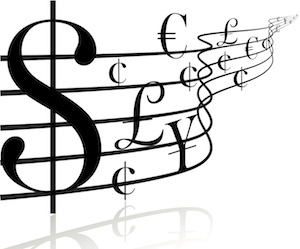 As music streaming continues to grow in popularity, it’s becoming more and more important for artists to understand how they can earn money from this new mode of music delivery.
As music streaming continues to grow in popularity, it’s becoming more and more important for artists to understand how they can earn money from this new mode of music delivery.
When it comes to interactive streaming services — the kind where you get to choose which songs you listen to (as opposed to non-interactive streaming services like Pandora) — there are four ways to make money.
When your music is played on Spotify, Beats Music, Rdio, and other streaming platforms, you are owed:
1. The regular ‘ole payment for the stream —
This money is sometimes called a “master use royalty,” an “artist royalty,” or “the master license fee.” What this means in plain-speak is that you’re being paid a fee every time a listener streams your sound recording via Spotify, Beats, etc. If you’re being distributed through CD Baby, these payments are reported in your accounting dashboard.
2. Performance royalties —
If you’re registered as both a songwriter and publisher with a performing rights organization such as ASCAP or BMI, then you’ll receive these royalties through them for any interactive streams.
If you’re not already registered with a performing rights organization, check out CD Baby Pro. We’ll affiliate you as a songwriter with ASCAP, BMI, SESAC, or SOCAN, register your songs with collection societies around the world, and make sure you’re set up to collect all your publishing royalties.
For more information about what performance royalties are, click HERE.
3. Mechanical royalties —
Services like Spotify and Rdio owe you a mechanical royalty every time a song you’ve written gets streamed on their platform. Sadly, mechanical royalties generally aren’t paid directly to independent songwriters — but to agencies like HFA (in the US). If you have a lot of plays on Spotify, those royalties are adding up AND going uncollected — unless you’re registered with Harry Fox as a publisher affiliate or have a publishing administrator like CD Baby Pro working on your behalf.
For more info about what mechanical royalties are, click HERE.
4. “Performance royalties” for the master recording —
Traditional music publishing is concerned with the composition itself — NOT any particular recording of the song. As such, traditional publishing royalties only get paid to songwriters and publishers. So what about the people who own the sound recording that is getting streamed? What about the people who performed on that track?
That’s where SoundExchange comes in. They collect a kind of non-publishing digital performance royalty on behalf of the folks who helped create a particular sound recording – including session players, the artist, record labels, etc.
Some streaming services pay these kinds of performance royalties to SoundExchange for “non-interactive” plays. For instance, Spotify pays SoundExchange when your music is played on Spotify Radio (as opposed to its on-demand/interactive streaming service).
To collect this royalty, register with SoundExchange today.
[hana-code-insert name=’publishing-guide-make-money’ /]
